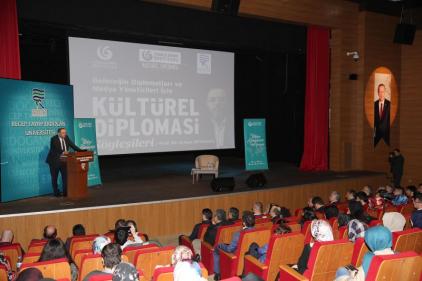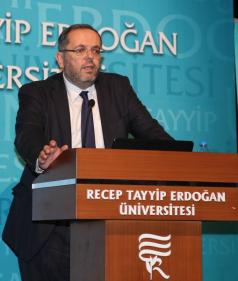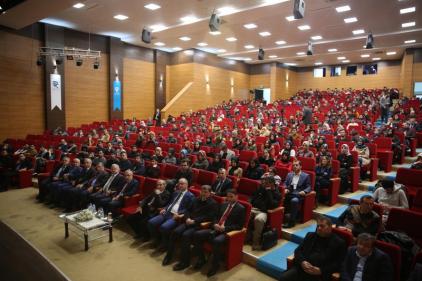“Cultural Diplomacy Bull Sessions” with Prof. Dr. Erhan Afyoncu
Yunus Emre Institute launched the bull session series on “Cultural Diplomacy for Prospective Diplomats and Media Managers” in collaboration with universities.
The first of the bull session series organized with the aim of further promoting Yunus Emre Institute within the borders of Turkey was held on Wednesday, December 20th in Recep Tayyip Erdoğan University and was presented by National Defence University Rector Prof. Dr. Erhan Afyoncu.
Prof. Dr. Erhan Afyoncu began his speech by emphasizing the historical background of Turkish nation, and he said that Turks are a nation that cannot survive without establishing states.
Marking that the policies followed by the Ottoman still have an influence today as they did in the past, Afyoncu pointed out that Ottoman was a state that was imitated and copied in the 16th century. Expressing that this structure went through a rapid period of transformation, Afyoncu said Ottoman diplomats and ambassadors always maintained the state's dignity in countries they visited despite this fact.
"Fahrettin Pasha is one of the most prominent figures in Turkish history"
Prof. Dr. Afyoncu reminded that when the British laid siege to Medina together with Arab rebels, Mondros Armistice Agreement was signed in October 1918, and that despite a whole empire surrendered, only one person did not. Afyoncu continued his speech as follows:
"Fahrettin Pasha did not surrender. They threw sand in soldiers' eyes, tied Pasha up and delivered him. Because he was protecting Prophet Muhammad's grave, Ravza-i Mutahhara, Fahrettin Pasha did not surrender although the state surrendered. Turks have a different affection towards the Prophet. This is our distinct perspective. The state surrendered but an Ottoman pasha did not obey the order and continued to struggle for three more months on those lands. After he left, he sent some of the sacred relics to Istanbul as well as 525 manuscripts in the libraries there. Most manuscripts had been entrusted to the libraries by the Turkish rulers. They are preserved in Topkapı Palace today at 'Egypt Library' section. Some senseless people including Turks claim that the Unionists looted them which is not true. Because we still have the register. There was only one work missing which was recovered later. Other than this, the relics, books and other sacred relics brought by Fahrettin Pasha are kept in Topkapı Palace today. This is a state approach. This is how the Ottomans viewed the public at that time."
Afyoncu, who responded to journalists' question regarding United Arab Emirates (BAE) Minister of Foreign Affairs Sheikh Abdullah bin Zayed's comment on the social media which drew reaction, said that Fahrettin Pasha was referred to as "desert tiger" and spoke as follows:
"For almost three years, a great Turkish commander defended Medina against the British. He took his place in the glorious and honourable pages of Islamic history. He defended Medina for three more months, until January 1919, despite state's surrender. He sent the sacred relics and manuscripts in those regions to Istanbul so that the British would not take hold of them. While some of the people there cooperated with the ancestors of today's British royalty, Fahrettin Pasha struggled so that the flag of Islam could not be hauled. He is one of the most prominent figures in Turkish history.”
Afyoncu ended his speech after advising the prospective diplomats to read the memoirs of local and foreign diplomats and to improve their knowledge on historical background.






